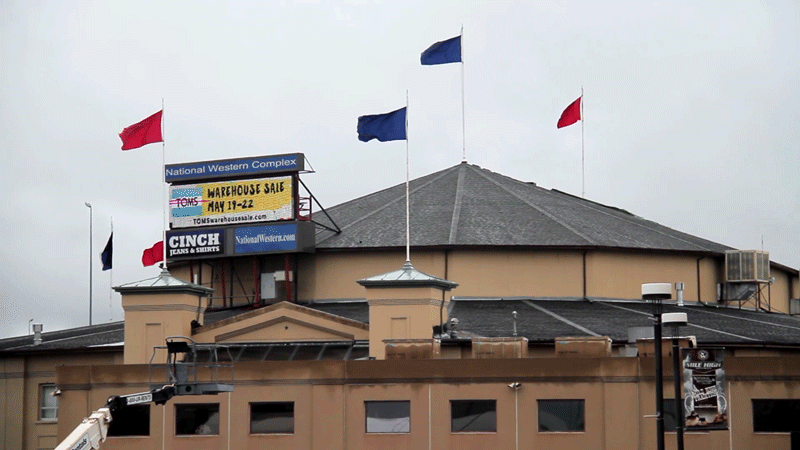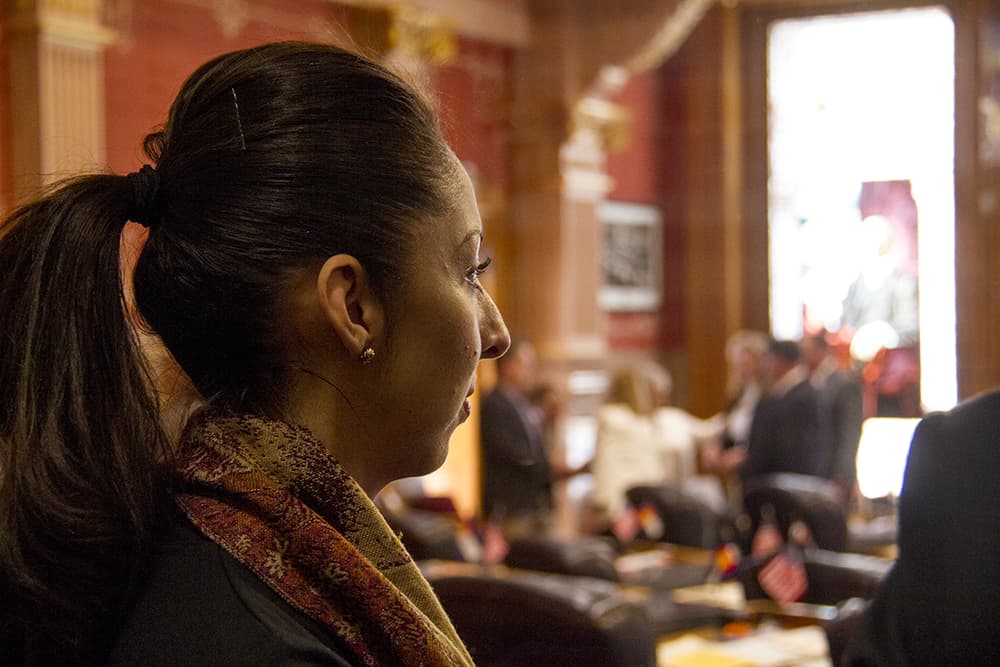
Community members want one more seat at the table where decisions about the National Western Center will be made for the next 50 years.
Denver is in the process of finalizing a framework agreement that will create an independent authority to carry out the massive redevelopment of the stock show grounds into a year-round event center and agribusiness hub and to operate this new facility going forward. That agreement calls for an 11-member board to be made up of six people appointed by the mayor of Denver, two people to represent Colorado State University, two people to represent the National Western Stock Show Association and one person to represent the neighborhoods of Globeville, Elyria and Swansea.
Community activists think the neighborhoods that will bear the brunt of the impact of the project should have at least as much representation as CSU and the stock show, and on Thursday, the National Western Center Citizens Advisory Committee voted 11-3 to recommend that the board composition be changed to add a second voting member from the community.
Even this recommendation was a compromise. Ideally, activists wanted three representatives -- one from each of the neighborhoods because they don't always have the same interests and needs.
This recommendation probably won't change the framework agreement.
Denver City Council is set to vote on the agreement this Monday -- when there will be a first reading and public hearing -- and again on Sept. 18 for second reading, but City Council can't make changes to contracts, which is what this agreement is. They can just vote yes or no.
And for a contract to be changed, all the parties would need to agree. A spokeswoman for CSU couldn't be reached Friday, and Paul Andrews, president and CEO of the stock show, said he can't comment on the matter until he takes it up with his board -- which he won't do unless the city asks, and the city hasn't asked.
Kelly Leid, executive director of the Office of the National Western Center, doesn't think the framework agreement should change, either.
That's not to say that Mayor Michael Hancock and future mayors couldn't use one of their six appointments to put another neighborhood resident or business owner on the board. Council President Albus Brooks, whose District 9 includes the National Western Center and the GES neighborhoods, said he'll organize a meeting between community members and the mayor to make the case for just that.
But the purpose of the framework agreement, Leid said, is to create an authority with specific financial and legal obligations around the expenditure of public and private funds. The board seats are distributed based on how much money each party is putting in ($622 million for the city, $200 million for CSU and $125 million for the stock show) -- and the neighborhood isn't putting in money.
"The big distinction here is this is is a contract that binds three parties, a city, a university and a non-profit organization, all of whom are putting in substantial amounts of money, that binds them to their respective organizations," Leid said. "That's why there is the organization of the board as defined."
Leid noted that other entertainment venues governed by authorities, like Mile High Stadium and Coors Field, don't have representation for the immediately adjacent neighborhoods, and the National Western contract was already changed once to include an additional non-voting member from the community in response to neighborhood concerns.
This argument doesn't sit well with some community members.
"The community's sacrifice for this project is being ignored," said neighborhood activist and advisory committee member Candi CdeBaca, pointing to the people who have been displaced as the city buys land for the National Western expansion. "They keep talking about the costs for the companies, but the community is paying that much more."
Back in 2015, community groups got on board with 2C, the ballot measure that extended taxes on hotels and car rentals to pay for the National Western redevelopment.
Drew Dutcher, president of the Elyria-Swansea Neighborhood Association and a member of the National Western advisory committee, recalls knocking on doors to persuade neighbors to support 2C, and they turned out in high numbers.
"We worked to pass 2C, and 2C was sold on the provision that it would help out the Globeville, Elyria-Swansea community," he said. "To say we aren't contributing? Goddam. This is public money."
Councilwoman At-large Debbie Ortega said the city needs to treat the residents of the surrounding neighborhoods like full partners. She's encouraged that the advisory committee will continue to meet even after the establishment of the new authority, per a recent letter from the mayor, and she hopes that Hancock will use one of his six appointments to give a voting seat to a second GES resident or business owner.
"The community feels like they've been full partners in this project, since being asked to come to the table and support the extension of the lodgers' tax," she said. "Ensuring they continue to be full partners is a critical part of that ongoing relationship that will exist as long as they are co-located."
From the outside, this might seem like a minor issue.
It's one vote on an 11-member board that, most likely, won't see many issues decided by one vote. And what's the difference, anyway, between asking the mayor to reserve one of his appointments for a community member and changing the framework agreement to designate an additional voting spot for the community (and reducing the mayor's other appointments to five members)?
The framework agreement was the result of months of negotiations between three entities, and the issue of representation was a sensitive one for all the parties, not just the community members who weren't part of those negotiations. With control of a majority of the seats, critics charge that the authority will be an extension of the mayor's office, not an independent entity. For community members, there's a principle at stake around representation, and there's also a desire to have more say in whether the new National Western becomes part of future bids for major events that would have a large impact on the neighborhood (a future Winter Olympics bid being the biggest fear).
Even if Hancock uses his appointments to include a community member now, without that written into the framework agreement, there's no guarantee that will remain the case.
However, Leid said it's important for the mayor to retain flexibility in his appointments because the skills needed on the board will change over time as the construction period ends and the authority serves as the operator of a giant entertainment venue. Right now, the board will require people with experience in project management, for example, but in 20 years, it might be more important to include people from the hospitality and entertainment industries.
Re-writing the framework agreement would also set back the start of construction -- and the start of opportunities to collect money for a community benefit fund.
"One of the most important things about big complex projects like this is stability and predictability about their delivery," Leid said. "One of the things I think we've done well is being very consistent is building toward our ability to get this project to construction. We are spending the people's money as we speak."
Brooks said community voices can be heard without re-opening negotiations, and getting the agreement in place is an important step forward.
"Per our charter, I don't negotiate the contracts, but as the president of City Council, I have a ton of influence, and I am trying to use that influence to convince the mayor to have another community member -- especially a business owner from GES -- as a voting member of the committee," he said.

CdeBaca said the recommendation from the advisory committee for a second voting member from the community serves as a test for how well the city is fulfilling its promises to allow for meaningful community input as the National Western project moves forward.
"This is what happens when community engagement is an afterthought," she said. "We were not in those meetings. ... This vote was about proving in a tangible way that they're going to listen to us or they're going to ignore us, because community was not involved in developing this framework agreement."
Next steps:
The Denver City Council holds a one-hour public hearing Monday on the framework agreement. The council meeting starts at 5:30 p.m. in council chambers in the City and County Building, 1437 Bannock St. Spanish language interpretation is available.
A final vote is set for Monday, Sept. 18.












